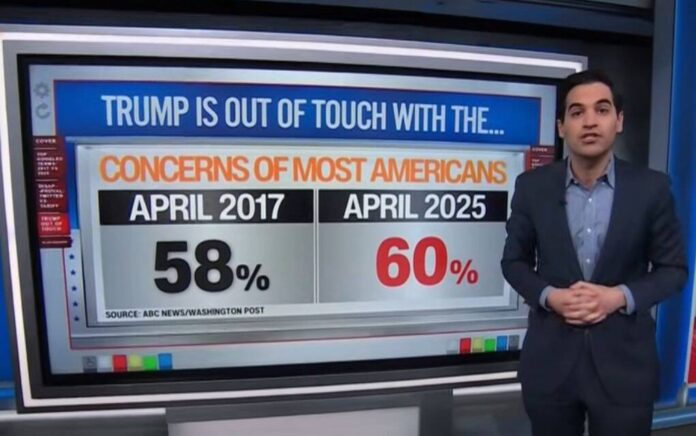
You know it’s bad for Leftists when CNN is coming out against you. Their party is in a complete free fall at the moment.
And this CNN analyst smacked Democrats with a stark reality check by issuing this ominous warning.
President Donald Trump’s approval ratings have taken a hit, particularly since his sweeping tariff rollout in April. Yet, CNN’s chief data analyst Harry Enten is urging Democrats to pump the brakes on any victory laps.
In a recent segment with host Sara Sidner, aired the morning after former Vice President Kamala Harris’ speech at San Francisco’s Emerge America gala, Enten laid out a sobering reality: despite Trump’s dip, he’s still outpacing Democrats on key issues that matter to Americans.
Enten’s analysis, drawn from a fresh CNN poll, shows Trump holding a slight edge over Harris in a hypothetical face-off. When asked who’s doing a better job as president right now, 45% of respondents picked Trump, while 43% said Harris would be doing a better job if she were commander-in-chief.
“It’s not just about regretting that vote. It’s literally saying who would be doing the better job right now? And Trump continues to score a higher percentage of the vote than Kamala Harris,” Enten said, pointing to numbers that echo the 2024 election outcome. Even with Trump’s favorability ratings cooling, he consistently outperforms Harris in head-to-head matchups across multiple polls.
The story doesn’t end with individual matchups. When pitted against Democrats in Congress, Trump’s lead grows starker. An ABC/Ipsos/Washington Post poll revealed that 40% of Americans trust Trump to tackle the nation’s pressing challenges, compared to just 32% for congressional Democrats.
“In fact, it’s not even close. It’s an eight point advantage, which in politics, well, that’s a wide ocean,” Enten noted. This gap highlights a critical dynamic: Trump’s numbers may look shaky in isolation, but when stacked against his competition, he shines.
Enten’s warning to Democrats is blunt: don’t mistake Trump’s unpopularity for a guaranteed win in 2026 or 2028. “If Democrats think that at this particular point, just because Donald Trump is unpopular, that they’re going to run away with it like a Heisman trophy winner, that is not necessarily the case,” he said.
"These numbers should be a major wake-up call for Democrats." Even now, Trump still does well when matched against Democrats.
— (((Harry Enten))) (@ForecasterEnten) May 1, 2025
-Trump 45%-Harris 43% on who'd be doing a better job as president
-Trump 40% to Dems in Congress' 32% on who can better deal with the main U.S. problems pic.twitter.com/P5Fg4KdLqG
The data serves as a wake-up call—Trump and Republicans as a whole are still resonating more with voters on the issues that dominate headlines. Democrats, Enten argues, can’t afford to assume the eggs are in their basket just yet.
This disconnect was on full display when Senate Majority Leader Chuck Schumer (D-NY) recently boasted about Trump’s sagging first-100-days approval numbers during a press conference. CNN’s Manu Raju quickly countered, noting Schumer’s own dismal 17% approval rating—the lowest in Congress. Schumer’s response? A dismissive “Polls come and go.” That shrug-off encapsulates a deeper issue for Democrats: a failure to grapple with their own vulnerabilities.
Why Democrats Are Struggling
The Democrat Party’s low approval ratings stem from a persistent focus on issues that don’t align with the immediate concerns of many Americans. While the party has doubled down on progressive priorities like climate initiatives and expansive social programs, voters are grappling with more pressing realities—rising costs, economic uncertainty, and border security.
Polls consistently show that inflation and job security rank among the top concerns for Americans, yet Democratic messaging often feels tone-deaf, emphasizing long-term goals over short-term relief.
Moreover, the party’s reliance on anti-Trump rhetoric as a unifying strategy has backfired. By framing every issue as a referendum on Trump, Democrats have neglected to articulate a compelling vision of their own.
Congressional Democrats, in particular, are seen as mired in partisan gridlock, with leaders like Schumer struggling to project competence or relatability.
Finally, the party’s internal divisions—between moderates pushing for pragmatic solutions and far-Leftists demanding systemic change—have muddied its message. This lack of cohesion leaves voters uncertain about what Democrats stand for, beyond opposition to Trump.
Until the party recalibrates, prioritizing the everyday struggles of Americans over ideological battles, its approval ratings will likely remain in the doldrums, leaving Trump and Republicans with an edge.
Stay tuned to The Federalist Wire.



















